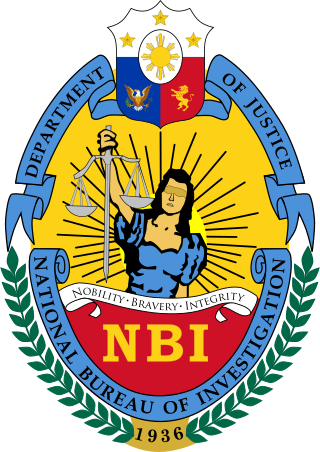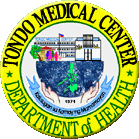
The United States Public Health Service is a collection of agencies of the Department of Health and Human Services concerned with public health, containing nine out of the department's twelve operating divisions. The Assistant Secretary for Health oversees the PHS. The Public Health Service Commissioned Corps (PHSCC) is the federal uniformed service of the PHS, and is one of the eight uniformed services of the United States.

A city is one of the units of local government in the Philippines. All Philippine cities are chartered cities, whose existence as corporate and administrative entities is governed by their own specific municipal charters in addition to the Local Government Code of 1991, which specifies their administrative structure and powers. As of July 8, 2023, there are 149 cities.

Quezon City, also known as the City of Quezon and Q.C., is the most populous city in the Philippines. According to the 2020 census, it has a population of 2,960,048 people. It was founded on October 12, 1939, and was named after Manuel L. Quezon, the second president of the Philippines.
Public holidays in the Czech Republic are defined by Act No. 245/2000, on national (public) holidays, on other holidays, on significant days and on days off from work. In addition to public holidays, this law also defines other holidays and significant days. Public holidays and other holidays are non-working days, significant days are working days. Public holidays "should remind citizens of the traditions, noble goals and historical twists and turns on which Czech statehood is built".

Regions of the Czech Republic are higher-level territorial self-governing units of the Czech Republic. Every region is governed by a regional council, headed by a governor (hejtman). Elections to regional councils take place every four years.

The Akbayan Citizens' Action Party, better known as Akbayan, is a democratic socialist and progressive political party in the Philippines. Akbayan is noted as a leading member of the progressive movement in the Philippines, having been formed in 1998 by a variety of progressive political organizations.

Malolos, officially the City of Malolos, is a 3rd class component city and capital of the province of Bulacan, Philippines. According to the 2020 census, it has a population of 261,189 people. It is the capital city of the province of Bulacan as the seat of the provincial government.

General Trias, officially the City of General Trias, formerly known as San Francisco de Malabon is a 1st class component city in the province of Cavite, Philippines. According to the 2020 census, it has a population of 450,583 people.

The National Bureau of Investigation is an agency of the Philippine government under the Department of Justice, responsible for handling and solving major high-profile cases that are in the interest of the nation.
The Balanced Budget Act of 1997 was an omnibus legislative package enacted by the United States Congress, using the budget reconciliation process, and designed to balance the federal budget by 2002. This act was enacted during Bill Clinton's second term as president.

The Tondo Medical Center, also known as Tondo Med, is a 300-bed capacity tertiary public medical center established in 1971, under the supervision and control of the Department of Health (DOH). It is located on North Bay Boulevard, Tondo, Manila, Philippines. Tondo Med has eight hospital departments, all of which are currently accredited with their respective specialty societies except for EENT and Radiology which are still in the process of accreditation with the DOH.

The Southern Philippines Medical Center (SPMC) is a government hospital under the Department of Health of the Republic of the Philippines. It is located at the JP Laurel Ave, Bajada, Davao City. It began as the Davao Medical Center. Its name was changed on November 19, 2009, by Republic Act 9792.

The Affordable Care Act (ACA), formally known as the Patient Protection and Affordable Care Act (PPACA) and colloquially known as Obamacare, is a landmark U.S. federal statute enacted by the 111th United States Congress and signed into law by President Barack Obama on March 23, 2010. Together with the Health Care and Education Reconciliation Act of 2010 amendment, it represents the U.S. healthcare system's most significant regulatory overhaul and expansion of coverage since the enactment of Medicare and Medicaid in 1965.
The policy of taxation in the Philippines is governed chiefly by the Constitution of the Philippines and three Republic Acts.

Dáil Éireann is the lower house, and principal chamber, of the Oireachtas, which also includes the president of Ireland and a senate called Seanad Éireann. It consists of 160 members, each known as a Teachta Dála. TDs represent 39 constituencies and are directly elected for terms not exceeding five years, on the system of proportional representation by means of the single transferable vote (PR-STV). Its powers are similar to those of lower houses under many other bicameral parliamentary systems and it is by far the dominant branch of the Oireachtas. Subject to the limits imposed by the Constitution of Ireland, it has power to pass any law it wishes, and to nominate and remove the Taoiseach. Since 1922, it has met in Leinster House in Dublin.

The Eastern Visayas Medical Center (EVMC) is a tertiary level teaching and training government hospital in the Philippines.

The East Avenue Medical Center (EAMC) is a government-owned tertiary general hospital located in Central, Quezon City, Philippines.

Baguio General Hospital and Medical Center (BGHMC), also known as Baguio General Hospital (BGH), is a hospital in Baguio, Philippines. It is the largest government funded tertiary hospital in the Northern Luzon Region.
The COVID-19 pandemic in the Czech Republic was a part of the worldwide pandemic of coronavirus disease 2019 caused by severe acute respiratory syndrome coronavirus 2. The first three confirmed cases in the Czech Republic were reported on 1 March 2020. On 12 March, the government declared a state of emergency, for the first time in the country's modern history for the area of the entire country. On 16 March, the country closed its borders, forbade the entry of foreigners without residence permits, and issued a nationwide curfew. While originally planned to be in effect until 24 March, the measures were later extended until 1 April and then again until the end of State of Emergency which was extended by the Chamber of Deputies until 30 April 2020 and then again until 17 May 2020.
İbrahim Şevki Atasagun was a Turkish soldier and statesman. In 1966, he served as acting president for 55 days when President Cemal Gürsel underwent medical treatments in the United States.















